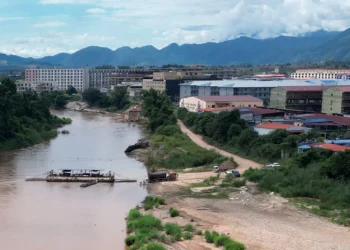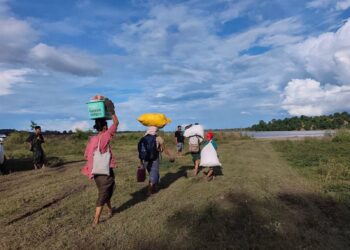Myanmar is racked by violence that began when the army ousted the elected government of Aung San Suu Kyi in February 2021 and brutally suppressed nonviolent protests. That triggered armed resistance and combat across the country, with the military increasingly using airstrikes to counter the opposition and secure territory.
The army is on the defensive against ethnic militias in much of Myanmar as well as hundreds of armed guerrilla groups collectively called the People’s Defense Forces, formed to fight to restore democracy.
The military has said in the past that it only attacks legitimate targets of war and has accused the resistance forces of being terrorists.
Andrews called the military junta’s plan to hold an election in late 2025 “a farcical parody” and “thinly veiled attempt to create an impression of legitimacy and relieve international pressure.” He warned, “Not only is this fraudulent attempt outrageous, it is dangerous, as it could lead to even greater levels of instability and violence.”
He ticked off grim statistics: Over 3.1 million people are displaced by conflict and the junta’s human rights violations, and 18.6 million people need humanitarian assistance, including 13.3 million facing emergency levels of food insecurity.
He said the junta’s military forces have killed more than 5,800 civilians, destroyed over 100,000 homes and other civilian structures, and have kept more than 21,000 political prisoners languishing behind bars.
He also said the military has responded to the Arakan Army’s steady losses in Rakhine by attacking civilians and raising tensions between the ethnic Rakhine and Rohingya communities.
Buddhist-majority Myanmar has long considered the Rohingya Muslim minority to be “Bengalis” from Bangladesh even though their families have lived in the country for generations. Nearly all have been denied citizenship since 1982.
In August 2017, attacks by a Rohingya insurgent group on Myanmar security personnel triggered a brutal campaign by the military, which drove at least 740,000 Rohingya to Bangladesh. The military is accused of mass rape, killings and burning thousands of homes.
Meanwhile, the military junta has conscripted thousands of Rohingya men and deployed them to the front lines to fight the Arakan Army, he said. And Rohingya militant groups have “cynically aligned with the junta” and committed human rights abuses against the ethnic Rakhine population.
“Hundreds of thousands of people in Rakhine State are completely cut off from humanitarian assistance and threatened by exposure, starvation and disease,” Andrews warned. “Failure to act immediately to provide emergency humanitarian aid will be a death sentence for untold numbers of innocent men, women and children.”
A month ago, he said, Nobel laureate Muhammad Yunus, the interim leader of Bangladesh where 1 million Rohingya refugees live, called on U.N. Secretary-General Antonio Guterres to convene a conference with all key players in the Rohingya crisis. Yunus has pressed for their repatriation to Myanmar.
Andrews urged Guterres to call a conference that could help “seize the attention of a distracted world and mobilize the resources and action necessary to save the many lives that hang in the balance.”






